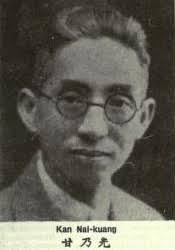Kan Nai-kuang (1897-September 1956), protege of Liao Chung-k'ai and early adherent of Wang Ching-wei, served the National Government as deputy secretary general of the Supreme National Defense Council (1942-44), vice minister of foreign affairs (1945-47), secretary general of the Executive Yuan (1947), and ambassador to Australia (1948-49).
Little is known of Kan Nai-kuang's background or childhood except that he was a native of Ts'ench'i, Kwangsi. He attended Lingnan University at Canton, where he studied political science and economics and became active in student politics. After graduation in 1920, he remained at Lingnan as a member of the faculty.
Canton was then the principal operating base of the Kuomintang, and Kan joined the party about the time of its reorganization in 1924. Kan's energy and ability attracted the attention of Liao Chung-k'ai (q.v.i, then a leading figure in the top command of the Kuomintang. He employed Kan as a secretary and apparently did much to advance his career. In 1925 Kan Nai-kuang was assigned to the Whampoa Military Academy as English secretary. He also managed two influential newspapers at Canton, the Kuo-min hsin-wen [citizens news] and the Min-kuojih-pao [republican daily]. By the time Liao Chung-k'ai was assassinated in August 1925, Kan Nai-kuang had become identified with Wang Ching-wei and Ch'en Kung-po (q.v.) in the Kuomintang. At the Second National Congress of the Kuomintang in January 1926, which was dominated by Wang Ching-wei's supporters, Kan was elected to membership on the Central Executive Committee. He also became one of the three secretaries of the party secretariat and director of the youth department of the Kuomintang. In May 1926, after Wang Ching-wei left Canton, Kan was relieved of the youth department post and was appointed to succeed the Communist Lin Po-ch'ü (q.v.) as director of the peasants department.
During the Nanking-Wuhan schism in the early months of 1927, Kan worked in Nanking with the Kuomintang faction led by Chiang Kai-shek. However, he came to the support of Wang Ching-wei when Wang began to purge the Communists at Wuhan in August. .After serving as a representative of the Wuhan faction at the unsuccessful party reunification meetings that were held at Shanghai in September, he accompanied Wang to Canton in late October. Chang Fa-k'uei (q.v.) and his troops returned from Wuhan to Kwangtung in November and ousted Li Chi-shen (q.v.). Soon afterwards, Kan was appointed mayor of Canton. It was during his administration that the Chinese Communists staged the December 1927 uprising which became known as the Canton Commune {see Chang T'ai-lei). After the return of Li Chi-shen to power in Canton, the central Kuomintang authorities at Nanking relieved Kan of his post in December 1927. Nanking charged him with "tolerating and i protecting" Communist rioters at Canton and censured him for alleged misappropriation of municipal funds. Kan Xai-kuang spent 1928-29 as a political exile. He went to the United States, where he studied political science at the University of Chicago. Later, on the way back to China, he visited England and Western Europe to observe public administration procedures. The Third National Congress of the Kuomintang, held in March 1929, again took strong action against left-wing elements in the party. Kan Xai-kuang and Ch'en Kung-po were "permanently" dismissed from the Kuomintang, and Wang Ching-wei was sent a written warning for alleged collusion with the Kwangsi clique of Li Tsung-jen and Pai Ch'ung-hsi in "anti- Xanking" activities. In later years, Kan, although remaining on friendly terms with Wang Ching-wei and Ch'en Kung-po, gradually extricated himself from his political connections with them and began to devote himself increasingly to the technical aspects of the government administration in China. Japanese aggression in Manchuria, beginning in 1931, forced some realignment of political factions in the Kuomintang. Kan Xai-kuang was readmitted to the party and was elected to the Central Executive Committee by the Fourth Xational Congress of the Kuomintang. He held administrative posts in the ministry of interior beginning in 1932, and he served as vice minister, under Huang Shao-hung (q.v.), in 1934-35. He also became a standing member of the committee on administrative efficiency of the Executive Yuan at X'anking. ^fter the Sino-Japanese war began, Kan moved westward to Chungking with the Xational Government. From 1938 to 1942 he was deputy secretary general of the central headquarters of the Kuomintang, serving under Chu Chia-hua, Yeh Ch'u-ts'ang, and Wu T'ieh-ch'eng (qq.v.), successively. From 1942 to 1945 he was deputy secretary general of the Supreme Xational Defense Council, serving under Wang Ch'ung-hui (q.v,). These positions were essentially administrative, and Kan had no voice in major political decisions at Chungking. After the Japanese surrender, Kan Xai-kuang became political vice minister in the ministry of foreign affairs. He assumed office in the autumn of 1945 and retained that post until mid-1947. When Chang Ch'ün v
Kan Xai-kuang wrote a number of works on problems of public administration and questions of administrative efficiency and personnel policy. Perhaps his best known work in this field is Chung-kuo hsing-cheng hsin-lun [new treatise on Chinese administration], published in 1947. Earlier works include Sun Wen chu-i chih li-lun yü shih-chi [the theory and practice of Sun Yatsenism], which appeared in 1926, and Hsien- Ch'in ching-chi ssu-hsiang shih [history of economic thought in the former Ch'in dvnasty], published in 1930.

甘乃光
字:自明
甘乃光(1897—1956.9),廖仲恺的亲信,汪精卫的早期追随者.在国民政府中任国防最高委员会副秘书长(1942—1944年),外交部次长(1945—1947年),行政院秘书长(1947年),驻澳大利亚大使(1948—1949年)。甘乃光的家世和幼年情况不详,只知道他原籍广西岑溪.他进广州岭南大学学政治学及经济学,热心学生的政治活动,毕业盾留在岭南大学。
广州是当时国民党活动的主要基地,甘乃光在1924年国民党改组时加入国民党。他的精力和才能引起廖仲恺的重视,那时康仲恺是国民党最高层的领导人物,他任甘乃光为秘书,并对甘大加提拨。1925年甘乃光在黄埔军官学校任
英文秘书,并主办两份很有影晌的报纸《国民新闻》和《民国日报》。1925年8月廖仲恺被刺后,甘乃光和汪精卫、陈公博在国民党内成为一伙。1926年1月,以汪精卫派居优势的国民党第二次全国代表大会中,甘乃光被选为中央执行委员,国民党秘书处的三位秘书之一,又是国民党青年部部长。1926年5月,汪精卫离广州,甘乃光解除青年都长之职,继共产党人林伯集任农民部长。
1927年宁汉分裂后,甘乃光在南京蒋介石这一派工作。8月,汪精卫在武汉清除共产党时,他又支持汪精卫了。他代表武汉出席于9月在上海召开的重新统一国民党的会议,该会未得结果。10月底,随同汪精卫到广州。10月,张
发奎率部从武汉回广东驱逐李济深,不久,甘乃光任广州市长。他在市长任内,中国北产党于1927年12月发动了广州公社的起义。李济深在广州重行掌权后,南京国民党当局于1927年12月解除了甘乃光的职务。南京方面斥责他容许和保护“共产党广州的叛乱”,和挪用市政公款。1928—1929年,甘乃光成了一名政治流亡者去美国,在芝加哥大学研究政治科学。他回国时又到英国及西欧其他国家考察政府行政程序。
1929年3月,国民党召开第三届全国代表大会,再次对党内左派势力采取强烈行动。甘乃光、陈公博被“永远”开除出国民党,汪精卫以勾结桂系李宗仁、白崇禧进行“反南京”活动受到书面警告。此后,甘乃光虽与汪精卫、陈公博
仍维持友好关系,但逐渐脱离了与他们的政治联系而致力于中国行政管理技术方面的工作。
1931年日本侵略东北,迫使国民党内的各派重新调整。甘乃光恢复国民党党籍,在国民党第四届全国代表大会中选为中央执行委员,从1932年开始在内政部任要职,1934—1935年,在黄绍竑之下任内政部次长,南京行政院行政技
术委员会常务委员。
中日战争开始卮,甘乃光随国民政府西迁重庆.1938—1942年先后在朱家骅、叶楚俭、吴铁城手下任国民党中央党部副秘书长。1942—1945年在王宠惠手下任国防最商委员会副秘书长。这些职务都是行政性质的工作。他在重庆的
重大政治性决定上并无什么发言权。
日本投降后,甘乃光任外交部政务次长,他于1945年秋到1947年中一直担任该职。1947年张群任行政院长,甘乃光任秘书长。翌年,出任驻澳大利亚大使,1950年辞职,留居澳大利亚,直至1956年9月短期患病后死在悉尼。
甘乃光写了一些有关行政管理和提高行政效率及人事政策冋题的著作,最
重要的著作是1947年出版的《中国行政新论》。其早期著作有1926年发表的
《孙文主义之理论与实际》和1930年发表的《先秦经济思想史》。